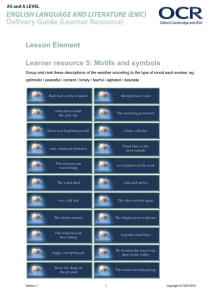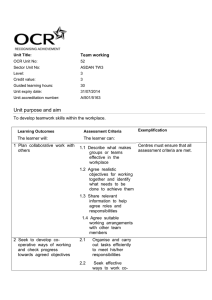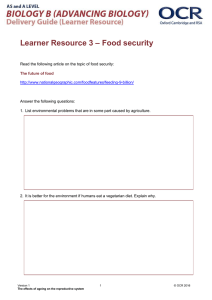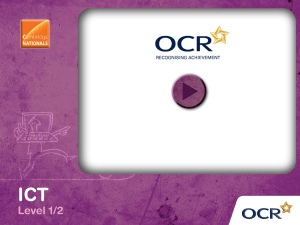Support young people to move towards independence and
advertisement
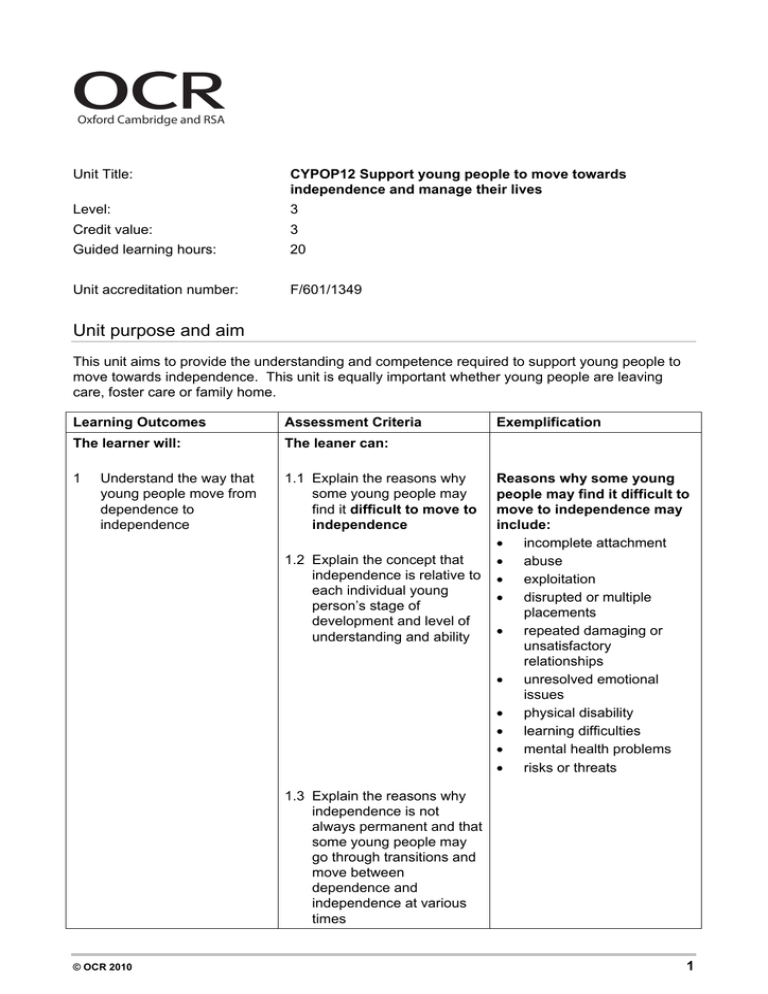
Unit Title: CYPOP12 Support young people to move towards independence and manage their lives Level: 3 Credit value: 3 Guided learning hours: 20 Unit accreditation number: F/601/1349 Unit purpose and aim This unit aims to provide the understanding and competence required to support young people to move towards independence. This unit is equally important whether young people are leaving care, foster care or family home. Learning Outcomes Assessment Criteria The learner will: The leaner can: 1 1.1 Explain the reasons why some young people may find it difficult to move to independence Understand the way that young people move from dependence to independence 1.2 Explain the concept that independence is relative to each individual young person’s stage of development and level of understanding and ability Exemplification Reasons why some young people may find it difficult to move to independence may include: incomplete attachment abuse exploitation disrupted or multiple placements repeated damaging or unsatisfactory relationships unresolved emotional issues physical disability learning difficulties mental health problems risks or threats 1.3 Explain the reasons why independence is not always permanent and that some young people may go through transitions and move between dependence and independence at various times © OCR 2010 1 2 Be able to prepare young people for the practical challenges of independence 2.1 Demonstrate how to work with young people to ensure that they can shop, store and prepare food that will provide a healthy, balanced diet 2.2 Prepare plans with young people that will assist them in maintaining their own health and well being 2.3 Provide young people with information to prepare them to manage and maintain accommodation and to find advice if necessary Managing and maintaining accommodation may include: knowing where to find accommodation process of renting accommodation legal position of tenants/lodgers basic maintenance landlord/tenant responsibilities 2.4 Provide young people with information about how to manage personal finances Managing personal finances may include: knowing how to budget knowing how bank accounts work avoiding/managing debt understanding money safety avoiding financial abuse knowing shoppers rights knowing financial rights knowing where to get financial advice 2.5 Explain why practical support and advice for independence is a long term project 2 Maintaining health and well being may include: registering with GP seeking medical advice attending medical screening as necessary registering with dentist regular dental check ups healthy balanced diet regular exercise rest and sleep © OCR 2010 3 Be able to prepare young people for the emotional challenges of independence 3.1 Demonstrate how to encourage young people to recognise the importance of society norms of acceptable behaviour and interaction 3.2 Provide young people with information about where to find support if they feel isolated or lonely 3.3 Explain how to support young people who may feel worried and ambivalent about becoming independent 3.4 Demonstrate how to support young people to develop resilience in order to face challenges and disappointments 3.5 Explain the importance of having somewhere that is ‘home’ 4 Be able to prepare young people to assess personal risks and protect themselves 4.1 Explain to young people how to assess risks in day to day situations 4.2 Demonstrate how to prepare young people to minimise risks Day to day risk situations may include: potential risks in pubs and clubs potential risks when shopping in crowds potential risks when obtaining cash from ATMs potential risks when shopping online potential risks when meeting people through the internet potential risks of opening door to strangers potential risks of purchasing goods from doorstep sellers 4.3 Provide young people with information and skills to protect themselves and know when to seek help © OCR 2010 3 Assessment This unit needs to be assessed in line with the Skills for Care and Development QCF Assessment principles. Assessment decisions for competence based learning outcomes (eg those beginning with ‘Be able to’) must be made in a real work environment by an occupationally competent assessor. Any knowledge evidence integral to these learning outcomes may be generated outside of the work environment but the final assessment decision must be within the real work environment. This unit is competence based. This means that it is linked to the candidate's ability to competently perform a range of tasks connected with their work. This unit may be assessed using any method, or combination of methods, which clearly demonstrates that the learning outcomes and assessment criteria have been met. This unit requires workplace assessment of occupational competence. Competence based assessment must include direct observation as the main source of evidence. Guidance on assessment and evidence requirements OCR does not stipulate the mode of delivery for the teaching of the content of this unit. Centres are free to deliver this unit using any mode of delivery that meets the needs of their candidates. Centres should consider the candidates’ complete learning experience when designing learning programmes. Details of relationship between the unit and national occupational standards This unit has been developed by Skills for Care and Development in Partnership with Awarding Organisations. It provides a key progression route between education and employment (or further study/training leading to employment). It is directly relevant to the needs of employers and relates to national occupational standards developed by Skills for Care and Development. As such, the unit may provide evidence for the following national occupational standards in the children and young people’s workforce developed by Skills for Care and Development: HSC: 38 HSC: 310 Additional information For further information regarding administration for this qualification, please refer to the OCR document ‘Administrative Guide for Vocational Qualifications’ (A850). The OCR Children and Young People’s Workforce Centre Handbook contains important information for anyone delivering, working towards or involved with the Children and Young People’s Workforce qualifications, of which this unit forms a part. This can be downloaded from OCR’s website www.ocr.org.uk. This unit is a shared unit. It is located within the subject/sector classification system 01 Health, Public Services and Care and 01.5 Child Development and Well Being. 4 © OCR 2010
